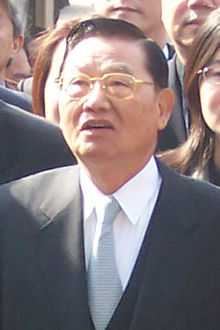Chiang Pin-kung
| Chiang Pin-kung 江丙坤 | |
|---|---|
 | |
| Chairman of the Straits Exchange Foundation | |
| In office 26 May 2008 – 27 September 2012 | |
| Deputy | Kao Koong-lian |
| Preceded by | Hung Chi-chang |
| Succeeded by | Lin Join-sane |
| Chairman of the Kuomintang (acting) | |
| In office 14 March 2007 – 11 April 2007 | |
| Preceded by | Wu Po-hsiung |
| Succeeded by | Wu Po-hsiung |
| Vice President of the Legislative Yuan | |
| In office 1 February 2002 – 31 January 2005 | |
| President | Wang Jin-pyng |
| Preceded by | Yao Eng-chi |
| Succeeded by | Chung Jung-chi |
| Minister of the Council for Economic Planning and Development of the Executive Yuan | |
| In office 8 June 1996 – 20 May 2000 | |
| Preceded by | Hsu Li-teh |
| Succeeded by | Chen Po-chih |
| Minister of Economic Affairs of the Republic of China | |
| In office 27 February 1993 – 8 June 1996 | |
| Preceded by | Vincent Siew |
| Succeeded by | Wang Chih-kang |
| Personal details | |
| Born | 16 December 1932 Taiwan, Empire of Japan |
| Nationality | |
| Political party | |
| Alma mater | National Taipei University |
Chiang Pin-kung (Chinese: 江丙坤; pinyin: Jiāng Bǐngkūn) (born December 16, 1932) is a politician in the Republic of China (ROC) on Taiwan. He is currently vice-chairman of the Kuomintang (KMT). He was the chairman of the Straits Exchange Foundation (SEF) from 2008 to 2012.
Biography
Chiang received his Ph.D. from the University of Tokyo in 1971. He was Assistant Commercial Attaché at the ROC Embassy in Japan from 1967 to 1974, Commercial Attaché at the ROC Consulate General in Johannesburg from 1974 to 1979, Economic Counsular at the ROC Embassy in South Africa from 1979 to 1981, Deputy Director-General of the Board of Foreign Trade (BOFT) from 1982 to 1983, Secretary-General of the China External Trade Development Council from 1983 to 1988, and Director-General of the BOFT from 1988 to 1989.
At the Ministry of Economic Affairs, Chiang served as Administrative Vice Minister from 1989 to 1990, Political Vice Minister from 1990 to 1993, and Minister from 1993 to 1996. From 1996 to 2000 he was Chairman of the Council for Economic Planning and Development. In this capacity, he was the special envoy of Lee Teng-hui at the 1998 and 1999 Asia-Pacific Economic Cooperation leader's summits (Lee was, because of pressure from the People's Republic of China, not permitted to attend). From 1998 to 2000 he was a Minister without Portfolio.
Family Life
Chiang is married to Mei-Fuey Chen with two sons and one daughter.
Political career
Chiang was elected to the Legislative Yuan in 2001 and was selected vice president of the legislature, a post he held until the Fifth Legislative Yuan adjourned in 2005. Chiang was re-elected to the Legislative Yuan in 2004 but did not take on the vice president post, which went to the KMT's alliance People First Party. There were ongoing negotiations for Chiang to join the cabinet of Premier Frank Hsieh as vice premier, but talks fell apart between the KMT and the administration over Chiang's specific responsibilities for the post.
In March 2005, Chiang led the KMT's first official delegation to mainland China since the end of major hostilities in the Chinese Civil War in 1949. The delegation paid homage to the 72 martyrs of the Tenth Revolution in Huanghuagang before travelling to the Sun Yat-sen Mausoleum in Nanjing and to Beijing. During the trip, Chiang promoted opening the three links and economic development.
On March 14, 2007, Chiang became acting chairman of the KMT after Wu Po-hsiung, who had been acting chairman since Ma Ying-jeou's resignation earlier in the year, resigned the acting chairmanship so that he could run for chairman in the upcoming party election.
Straits Exchange Foundation
Following the Kuomintang's landslide win in the presidential election in 2008, Chiang was designated as chairman of the Straits Exchange Foundation, the semi-official body responsible for negotiation on non-political matters with the People's Republic of China. This made him responsible for the front line negotiations with the PRC government. He resigned in May 2009 due to health and age reasons.[1] He was 76 years old, and hoped to spend more time with his family. Some newspaper and magazine reported Chiang's family gained more businesses in mainland China from warming ties.[1] He has rejected the quitting as being politically motivated.[1] A few days later President Ma Ying-jeou paid a visit to Chiang to persuade him to stay. He confirmed that he would not retire.[2]
References
| Government offices | ||
|---|---|---|
| Preceded by Vincent Siew |
Economic Affairs Minister of the Republic of China 1993–1996 |
Succeeded by Wang Chih-kang |
| Preceded by Hung Chi-chang |
Chairman of the Straits Exchange Foundation 2008–2012 |
Incumbent |
| |||||||
